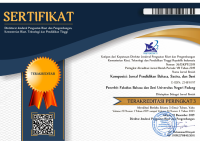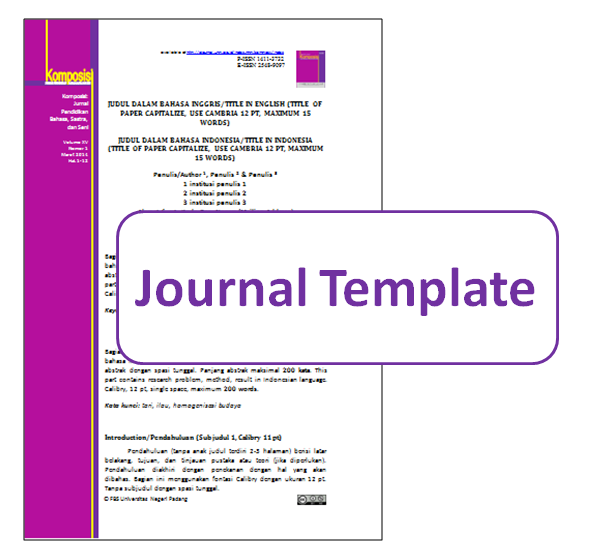THE DEVELOPMENT OF ENGLISH TEACHING MATERIALS ORIENTED PROJECT BASED LEARNING BASED ON ICT
Abstract
This research is about the development of ICT-based Project Based Learning Approach towards English instructional materials of high schools’ students in Batam. The purpose of this study is to produce the English student modul grade X with project-based learning (PjBL) approach which based on ICT. This research includes the study of R & D (Research and Development). This study aims to determine the effect of the use of the product (modul) to the students’ communictive competence. The method of this research is a research and development. The Population was students of Grade X SMAN 1 Batam. The results of this study revealed that the modul of PjBL with ICT was valid. It is proved by the result of t test. It found that t score is higher than t tabel where t tabel is 1,670 and t score is 2, 3547 with significance degree 5 %. It means that there are differences score between control class and experiment class. Thus, it can be concluded that the development of ICT-based Project Based Learning Approach towards English instructional materials of SMA students in Batam is a valid and efective product becouse it is proved by the increasing of student’s communicative competence.
Keyword: Project Based Learning, ICT, Communicative Competence
PENGEMBANGAN BAHAN AJAR BAHASA INGGRIS BERORIENTASI PROJECT BASED LEARNING BERBASIS ICT
Abstrak
Penelitian ini membahas tentang pengembangan Pendekatan Pembelajaran Project Based Learning (PjBl) berbasis ICT terhadap bahan ajar bahasa Inggris untuk siswa-siswa Sekolah Menengah Atas di Batam. Tujuan dari penelitian ini adalah untuk menghasilkan modul Bahasa Inggris kelas X dengan pendekatan pembelajaran proyek (PjBL) yang berbasis pada ICT. Penelitian ini berjenis R&D (Penelitian dan Pengembangan). Penelitian ini juga bertujuan untuk mengetahui pengaruh penggunaan produk (modul) terhadap kompetensi komunikatif siswa. Metode penelitian ini adalah penelitian dan pengembangan. Populasi dari penelitian ini adalah siswa kelas X SMAN 1 Batam. Hasil penelitian ini menunjukkan bahwa modul PjBL yang berbasis ICT valid. Hal ini dibuktikan dengan hasil uji t. Nilai t hitung lebih tinggi dari t tabel dimana t tabel sebesar 1. 670 dan t skor adalah 2, 3547 dengan tingkat signifikansi 5%. Artinya ada perbedaan skor antara kelas kontrol dan kelas eksperimen. Dengan demikian dapat disimpulkan bahwa pengembangan Pendekatan Pembelajaran Berbasis Proyek (PjBl) berbasis ICT terhadap materi ajar bahasa Inggris siswa SMA di Batam merupakan produk yang valid dan efektif, karena terbukti dengan meningkatnya kompetensi komunikatif siswa.
Keyword: Project Based Learning, ICT, Kompetensi komunikatif
Full Text:
pdf (Bahasa Indonesia)References
Abidin. (2014). Desain sistem pembelajaran dalam konteks kurikulum 2013. Bandung: Refika.
Biggs. (1989). Approaches to the enhancement of tertiary teaching higher education research and development. Higher Education Research and Development, (No 8), 7–25.
Francese, R. , Gravino, C. , Risi, M. , & Scanniello, G. (2015). Journal of visual languages and computing using project-based-learning in a mobile application devel- opment course — An experience report. Journal of Visual Language and Computing, 1–10. https://doi. org/10. 1016/j. jvlc. 2015. 10. 019
Kapusuz, K. Y. , & Can, S. (2014). A Survey on lifelong learning and project-based learning among engineering students. Procedia - Social and Behavioral Sciences, 116, 4187–4192. https://doi. org/10. 1016/j. sbspro. 2014. 01. 914
Lasauskiene, J. , & Rauduvaite, A. (2015). Project-based learning at university: Teaching experiences of lecturers. Procedia - Social and Behavioral Sciences, 197 (February), 788–792. https://doi. org/10. 1016/j. sbspro. 2015. 07. 182
Majid. (2009). Perencanaan pembelajaran: Mengembangkan standar kompetensi guru. Bandung: Alfabeta.
Makitan, V. , & Karuovi, D. (2015). Computers & education adolescents’ informal computer usage and their expectations of ICT in teaching e case study: Serbia Dragana Glu, 81. https://doi. org/10. 1016/j. compedu. 2014. 10. 006
Monalisa, M., Ardi, H. (2013). Using “edmodo” educational social network in teaching English for high school students. Journal of English Language Teaching. 2(1). 220-225.
Motteram, G. (n. d. ). Innovations in learning technologies for English language teaching.
Musa, F. , Mufti, N. , Latiff, R. A. , & Amin, M. M. (2012). Project-based learning (PjBL ): inculcating soft skills in 21 century workplace, 59 (2006), 565–573. https://doi. org/10. 1016/j. sbspro. 2012. 09. 315
Muslim, O. (n. d. ). Teknologi informasi dalam pendidikan, 1–11.
Sugiyono. (2012). Metode penelitian kuantitatif, kualitatif dan R&D. Jakarta: CV Alvabeta.
Suwandi, E., Refnaldi, R., Ardi, H. (2013). The effectiveness of using e-learning moodle for homework in improving reading ability of grade x students of SMAN 4 Padang. Journal of English Language Teaching. 1(3), 10-17.
DOI: https://doi.org/10.24036/komposisi.v18i2.8427
Refbacks
- There are currently no refbacks.
Copyright (c) 2018 Komposisi: Jurnal Pendidikan Bahasa, Sastra, dan Seni

This work is licensed under a Creative Commons Attribution-NonCommercial 4.0 International License.
Komposisi: Jurnal Pendidikan Bahasa, Sastra, dan Seni, a peer-reviewed online journal in languages, literature, and arts education.
Printed ISSN 1411-3732, Online ISSN 2548-9097.
Currently, Komposisi: Jurnal Pendidikan Bahasa, Sastra, dan Seni is indexed by:











